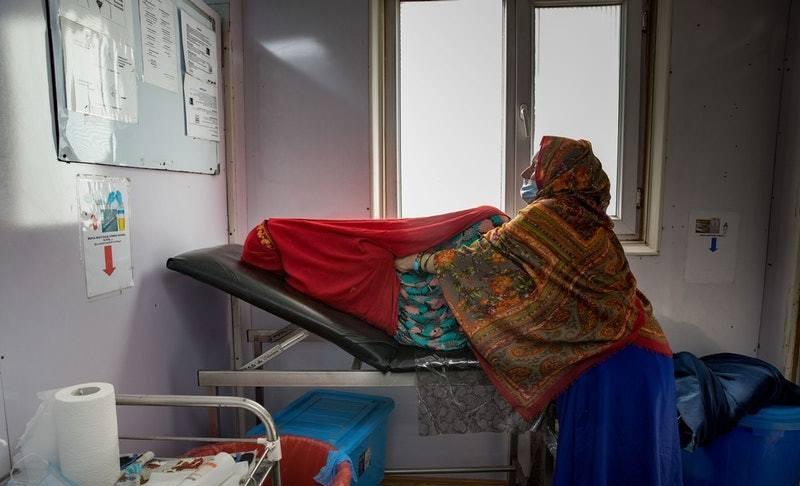Despite political instability and the consequent medical and economic problems, babies are still born in Afghanistan. At MSF's Khost Women's Hospital, women continue to be on the front lines, providing vital care to new mothers and their babies.
MSF opened the Gynaecological Specialist Hospital in 2012 to provide safe and free gynaecological and neonatal care to mothers and babies in eastern Afghanistan. In the countryside and away from the big cities, most women do not have access to basic obstetric care, which is exacerbated by the shortage of female midwives and doctors.

MSF is funded by private donations and is not influenced by the political orientation of the Government. We continued to provide health care in Khost and elsewhere in Afghanistan, witnessing significant funding cuts in the health system and economic measures against the new government leading to the financial crisis. After funding for the health system was suspended in August 2021, women doctors and midwives were unable to access the supplies and salaries they needed for work. Although partial funding has now been resumed, the Afghan health system is still less funded than in the past, making it difficult to improve the health system that has been ineffective for many years and cannot meet people's needs.
At our Khost Gynaecological Facility, almost all of the medical staff are women, hence the description of a "women's hospital for women". MSF is one of the largest employers of local women, with more than half of its 450 employees now women, including doctors, midwives, cleaners and nannies. It is important to have an all-female team here to ensure gender differentiation and patient peace of mind. Families also know that their wives, mothers and daughters will be cared for here.
Horst Obstetrics has a 60-bed inpatient unit, an 8-bed delivery ward, a 28-bed neonatal nursery (including a 10-bed neonatal intensive care unit), 2 operating theatres, and a "kangaroo mom care area" that encourages physical contact between mothers and babies. We vaccinate newborn babies, as well as family planning services and other health campaigns.
Since its inception, it has focused on complex gynaecological cases, such as pregnant women who have had different complications of childbirth. However, given the chaos and instability caused by the regime change, we decided in August 2021 to expand the criteria for accepting patients. At that time, the market and transportation system were out of operation, and people stayed at home, not knowing whether medical facilities were still open. Most of the problems have improved, but the lack of money still makes it difficult for pregnant women to give birth safely.
Lou Cormack, MSF's Horst programme director, said: "We quickly noticed a decline in the carrying capacity of the healthcare system. Due to supply chain disruptions, fewer and fewer drugs are available in public facilities, staff are not being paid, and we even heard that a local hospital can only use flashlights for surgery. The public health system, which was already in trouble before the funding cuts, is now almost completely paralyzed."
MsF team assisted with 1,650 births in September 2021 and more than 2,000 in November. Aqila, a midwife we hired locally, said: "We have recently received a lot of patients, one more time, assisted in 73 deliveries and the number of patients has been rising over the past few months. We know that this is due to the closure of public facilities and the high fees charged by private doctors. Women who give birth at home because they cannot afford medical care are at risk, including complications of childbirth bleeding or high blood pressure in pregnancy, but no one has diagnosed them."
Even when health facilities lose vital funding, care still does its best to provide care for pregnant women. Cormac said: "In the public sector, we have heard of people raising funds to buy medical supplies to ensure that medical facilities can continue to be open. If a pregnant woman needs to have a caesarean section, they will pool up enough fuel to use a generator during surgery, but these medical and other civil servants themselves have not been paid for months."
"At 8 basic medical facilities on the outskirts of Khost, we have been supporting the delivery ward. We have recently carried out additional repairs to ensure that the delivery room continues to operate, and we have also purchased some fuel to allow the delivery room to operate at night and provide the kits needed for a normal delivery, including some medication, hygiene products and a hat to keep the baby warm."
An organization that operates several local medical centres in the Khost area has received funding until January. When these facilities are fully operational and used by locals again, our obstetrics department will return to its original standards of patient acceptance, focusing on pregnant women with complications from childbirth, but what will happen after January is unknown."
Afghanistan is in a time of turmoil, coupled with enormous challenges in accessing health care. Archira said she felt great comfort in being able to assist women in her community. "I love helping women who give birth in Horst, MSF is a safe place for them and where I give birth to my own baby," she said. I love being a part of this place to help babies and women. I really like these moms because they suffer so much."